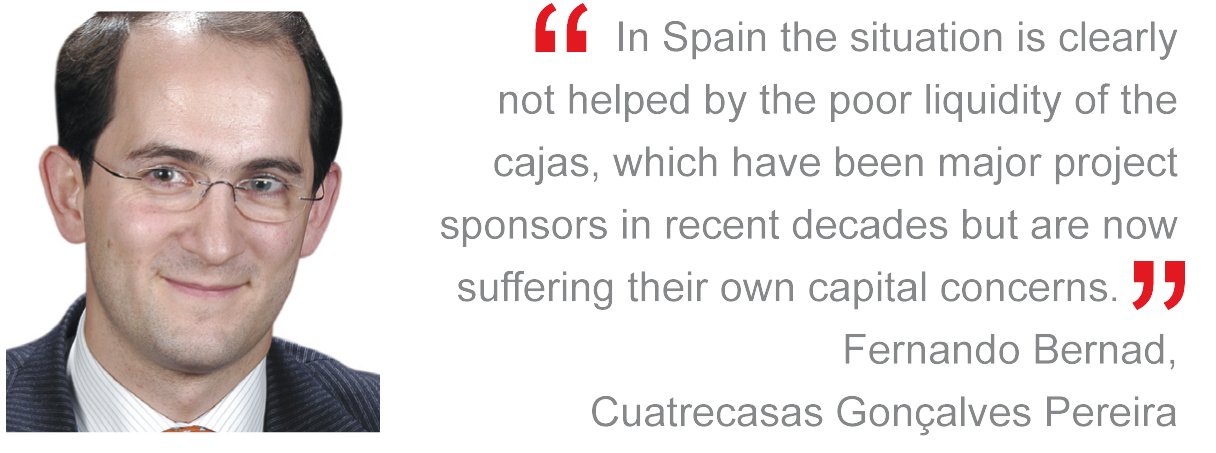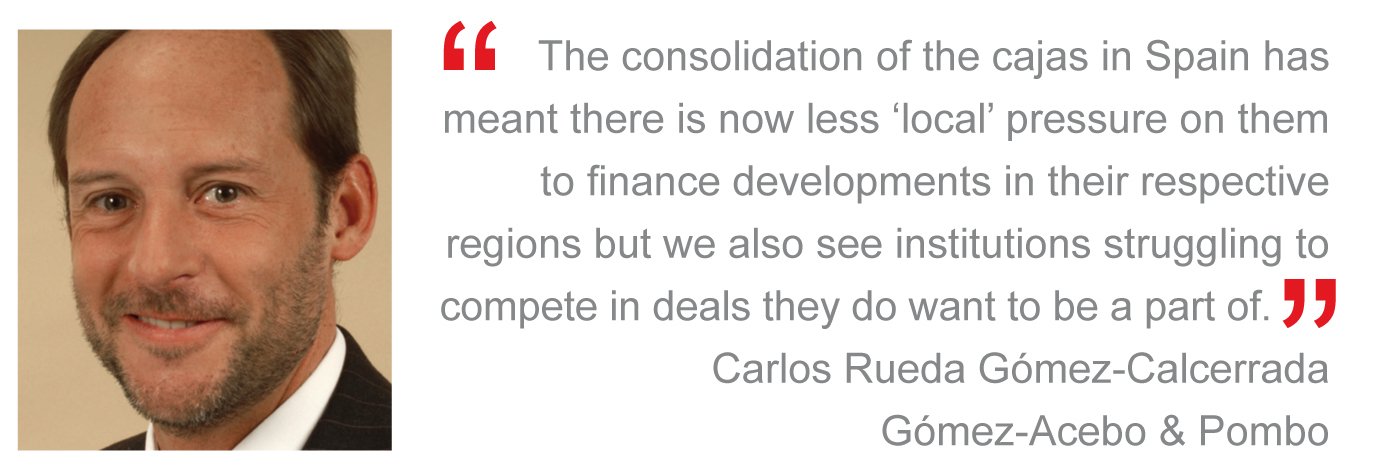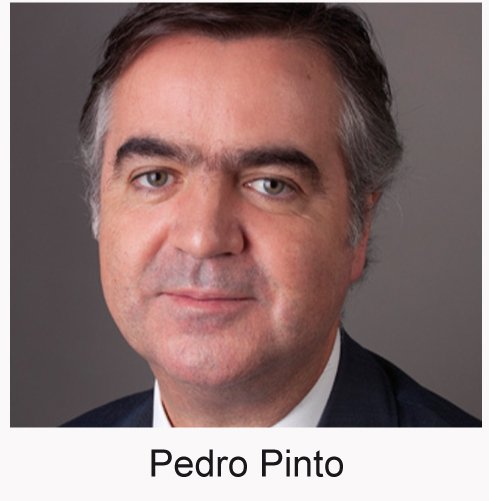Projects & Finance Report 2011: On hold: Iberia’s projects paralysis
There is no doubt that the Iberian projects sector has been significantly affected by the economic downturn, say the region’s lawyers.
Austerity drives by the Spanish and Portuguese Governments have seen projects cancelled, delayed or reduced as public spending has been cut, access to bank financing has become more difficult and the viability of many projects is questioned.
Indicative of the financing pressures facing Iberia, and the lost projects opportunities as a result of budget cuts, Spain alone has seen over 230 public projects cancelled or delayed as the Government has sought to slash a budget deficit equivalent to 11.2 percent of gross domestic product (GDP).
“We see a significant focus towards cost and budgetary control on the part of the Government, regional and local authorities and risk management on the part of sponsors and contractors,” says Mariano Magide, public law Partner with Uría Menéndez in Madrid.
The major challenge is certainty, says Fernando Bernad, projects Partner with Cuatrecasas Gonçalves Pereira in Madrid. “We are seeing continuing levels of discomfort among the financing banks and in part this is driven by a lack of belief in projections for demand-led projects. But in Spain the situation is clearly not helped by the poor liquidity of the cajas, which have been major project sponsors in recent decades but are now suffering their own capital concerns.”
In Portugal the financing situation is even more acute. The major domestic banks are also facing their own liquidity concerns in line with the deteriorating situation at the national level, where there is a popular belief that public-private partnerships (PPP) and project finance initiatives (PFI) are among the main causes of the country’s debt problems.
“We see the coming year as probably more problematic than last year, as clients continue to assess the risks associated with doing business in Portugal and of course the financing challenges,” says Maria Castelos, Partner at Campos Fereira Sá Carneiro & Asociados (CS Associados) in Lisbon.
Criticism of the role of PPP/PFI in exacerbating Portugal’s financial troubles is however unfair, believe many lawyers. The issue is more about poor decision-making and the choice of projects pursued rather than the finance model used.
“At present, there is very little good news and this negativity is compounded by the fact that there is also now a strong body of opinion that is against further major investment. It has been a political decision to put most projects on hold. One can nevertheless trust that some of those projects will be (re)launched in the medium or long term future and the opportunities now suspended may surface again in due time,” says Bernardo Diniz de Ayala, public law Partner at Uría Menéndez-Proença de Carvalho in Lisbon.
Portugal’s 2011 Budget foresees even greater selectivity in the evaluation of new projects and those already in the pipeline. Although not officially cancelled, the fast rail connections between Lisbon-Porto and Porto-Vigo are unlikely to be implemented in the near future, say lawyers.
The current situation continues the dramatic negative swing in the fortunes of the projects market. “The current circumstances are undoubtedly very complicated and there is justifiably concern over the attraction and viability of many proposals on the part of both the Government and sponsors. But the market is not completely dead. Deals are still being done, albeit in a much more analytical way,” says Carlos Rueda Gómez-Calcerrada, projects Partner at Gómez-Acebo & Pombo in Madrid.

Re-scheduled
Such a scenario presents inevitable challenges both to the sector and the law firms that focus on it, admit lawyers. Public spending cuts have already been dramatic but further spending reductions are also anticipated.
“It may be too soon to give any figures for 2011 but I would not be surprised if infrastructure cutbacks were around 10-20% compared to 2010. No project is likely to come out unscathed, with the exception perhaps of those projects relying on EU funds,” says Francesc Segura, Partner with Roca Junyent in Barcelona.
Even strategic areas of economic activity are suffering. “A reduction in public investment can also be appreciated in the energy sector. The Spanish Government is now rescheduling its energy plan by which it specifies the infrastructure to be built and paid for – by energy consumers – in the following years. In non-regulated activities, investment has reduced over uncertainty in the renewable energy tariff framework,” says Gervasio Martínez-Villaseñor, energy specialist and Partner with Garayar Asociados in Madrid.
One area of good news in Spain is the Government’s ongoing commitment to its €17bn infrastructure plan (PEIT), which includes significant investment in the railway network (accounting for 70 percent of the funding) and in motorways (30 percent). “In this sense the Government has clearly bet on PPPs with more secured returns to investors on an availability basis and not linked to other traditional and uncertain criteria such as traffic in highways, for example,” says Ignacio Ruiz-Cámara, Partner with Allen & Overy in Madrid.
The PEIT followed the cancellation of earlier “non-strategic” works that were granted but not initiated.
The situation is similar in Portugal with PPP/PFI projects now under scrutiny by a Government Commission. “In one way or another all infrastructure sectors are suffering. The energy sector, though, remains active and is therefore an exception, with ongoing tenders for the construction of dams and regarding renewable energies,” says Pedro Melo, public law Partner with PLMJ in Lisbon.
A recurring challenge for new projects is to put in place contractual structures requiring less engagement by the State and an increasing role for private sponsors and other finance entities.
“Even those projects that seemed more likely to be executed are now uncertain,” says Alberto Galhardo Simões, projects Partner at Miranda. An example is the proposed third bridge crossing across the River Tagus, part of the second stretch of the high speed rail project that will complete the Lisbon-Madrid axis. “The Government indicated that the tender would be launched at the beginning of 2011 but political conditions do not seem to favour it.”
Law firms are therefore now seeing much smaller projects and those deemed by the Government and local authorities as essential. “The Government’s public school building programme was announced before the onset of the crisis and is now ongoing. There is still spending on social infrastructure,” says Inês Pinto da Costa, public law specialist at PLMJ.
New models
With finance the major concern, lawyers report that clients have to look at new methods to bridge gaps and to overcome ongoing construction concerns.
“The contractors and banks the Government needs are already nursing big potential losses and the major construction and concessionaries have conditioned their participation in the Spanish Government’s PEIT stimulus plan on the salvation of, at least, four operational real toll roads – Radiales de Madrid, Cartagena-Vera, Madrid-Toledo and Eje Aeropuerto M-12 – which are all experiencing 50 percent to 80 percent lower traffic than initially predicted,” says Israel Gómez-Caro Gil, Partner with Gold Abogados in Madrid.
Banks are seeking to bullet-proof refinancing schemes but there is also a trend towards alternative financial models and increasing interest in the use of the capital markets, while investment funds are also beginning to assess market opportunities, say lawyers.
“The recently-announced “Project Bonds Initiative” launched by the European Commission and European Investment Bank may prompt investors to enter the capital markets and should serve to reinitiate paralysed projects that lack long-term bank financing,” says Luis Muñoz, Partner with Jones Day in Madrid.
Lawyers insist however that the PPP/PFI model is not broken. Projects abound outside of Europe and many are built around finance and legal models developed in Spain and Portugal. “PPP is still an option and in the first semester of 2011 new projects will be launched, while the bond markets should also improve especially in the infrastructure field,” says Juan Martínez Calvo, Partner with Deloitte.
The situation facing Iberia’s banks is though having an impact on both their ability and willingness to invest in new projects. “The consolidation of the cajas in Spain has meant there is now less ‘local’ pressure on them to finance developments in their respective regions but we also see institutions struggling to compete in deals they do want to be a part of,” says Rueda Gómez-Calcerrada at Gómez-Acebo & Pombo.
The lack of liquidity is reinforcing the role of multilateral entities, which are trying to design their policy vis-à-vis commercial banking, note others. “What we are going to start seeing is hybrids of debt tranches and equity investments. Until now we have seen a development of the so-called mezzanine debt, which takes on risks that banks usually reject while demanding more rights than a regular shareholder. This is where new interesting opportunities open up for infrastructure funds and other investment funds,” says José Guardo, Head of Projects at Garrigues.
A similar view is held in Lisbon where bank credit is a much more significant source of funding than in many other economies. Between 2000 and 2009, bank credit accounted for nearly 70 percent of funding for the Portuguese economy, in contrast with ratios of 40 percent in France, almost 55 percent in Germany and Spain, and less than 20 percent in the US, according to World Bank data, notes Manuel de Andrade Neves, Partner at Abreu Advogados.
The constraints on the lending capacity of the major domestic banks means that even small projects are sometimes challenging to get off the ground. “Shareholders are now putting in more of their own funds, and we see the re-appearance of mini-perm lending structures. There also seems to be an increasing appetite for second market acquisitions,” says Francisco Ferraz de Carvalho, Counsel with Linklaters in Lisbon.
Teresa Empis Falcão, a finance lawyer at Vieira de Almeida agrees. “We have sovereign debt concerns and the banks are facing an adverse environment, but I strongly believe that the PPP model remains vigorous and attractive to all the players involved, provided that a well-structured risk allocation is established and agreed between the private and public sector.”
There is still money out there but it is now in different places, it is too expensive or too risk averse to invest in Portugal, say others.
“The most realistic and practical option that is emerging is to obtain funding for projects through sovereign wealth funds or State enterprises from resources-rich countries. These are the players of the moment, and those that are giving liquidity for projects in Europe and worldwide,” says Nelson Raposo, Managing Partner of Raposo Bernardo in Lisbon.
New markets
With uncertainty in the domestic markets, lawyers report that their clients are invariably now looking to new opportunities internationally.
“The ability to expand and to work outside national borders is clearly one of the main challenges Portuguese construction companies must embrace in order to maintain activity,” says Miguel Loreno Brito, Partner with Lisbon’s F Castelo Branco & Associados.
Recent reports state that over the past year Spanish companies including Acciona, ACS, FCC, Ferrovial, OHL and Sacyr Vallehermoso have seen international revenues increase by 18 percent, with project order books outside of Spain worth €27.5bn. Likewise Portuguese companies like Brisa are seeing tremendous success internationally, in markets across Latin America – Brazil, Chile and Peru – but also elsewhere in Europe, in the UK, across the Middle East and Africa.
Iberian law firms are already well-positioned across Latin America, and also now in eastern Europe and north Africa. But other markets play to the strengths of the Anglo-Saxon firms with offices in Madrid and Lisbon, believe some.
“Without doubt the best opportunities will come from abroad,” says Lucas Osorio, Partner with Hogan Lovells in Madrid. “As the most important companies in the sector are Spanish they will have good opportunities. However, in order to do so they should be well structured, financially balanced and prepared to invest in countries where opportunities arise; some of which may involve certain country risks.”
Lawyers accept that the outlook for the projects sector across Spain and Portugal will be difficult for the foreseeable future. Major infrastructure investment will be reduced and what new projects do emerge will be much more closely scrutinised.
“In light of the concerns that have emerged over the use of valid usage projections new contracts containing PPP formulas take into account availability risk (how much competition there is in the market) to a much greater degree than demand risk,” says Ignacio Paz, Partner with Herbert Smith in Madrid. For proposed schemes, the greatest difficulty will be to structure contracts properly and determine the parameters to take into account to remunerate the private partner.

Law firms must therefore look to new sector opportunities beyond advising clients on tender bids. “With the budgetary constraints and the temptation for budget cuts, Governments will try to renegotiate major project contracts. Basic constitutional and legal principles will be at stake. Lawyers will be on the battle front of negotiations both for the public and private side. It is important to reach a balanced settlement that will not compromise the company rights, fiscal consolidation or the mentioned principles,” says Lino Torgal, public law Partner with Sérvulo in Lisbon.
Infrastructure companies are already divesting non-core assets to enable them to continue investments in more strategic areas of operation, while delays in payment by contractors and public administrations are prompting an increase in disputes between parties. The type of commercial and legal activity surrounding projects is changing from managing investments to managing problems, say lawyers.
“The challenge is to structure organisations, clean their accounts and wait for a change of cycle for them to undertake new national or increasingly international investments,” says Lucas Osorio, at Hogan Lovells.
Alternative opportunities are emerging at home – the planned privatisation of both the Spanish and Portuguese airport operators (AENA and ANA respectively) presents opportunities for companies and law firms: 14 firms bid for €1.3bn ANA privatisation mandate – but the major prizes increasingly lie abroad.
“We now see three main types of projects activity, smaller domestic social schemes mostly related to education and health, major domestic infrastructure projects, which are increasingly few and far between, and those taking place outside of Iberia – which offer boundless opportunities. Our task is to demonstrate to clients that our expertise matches their ambition,” concludes João Rosado Correia, projects Partner with Garrigues in Lisbon.












